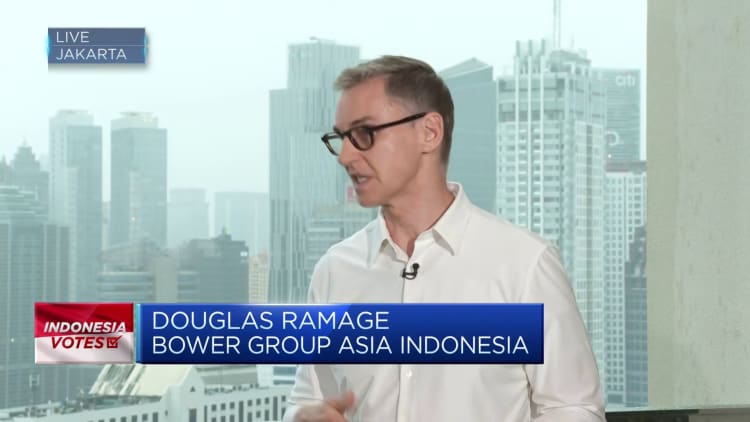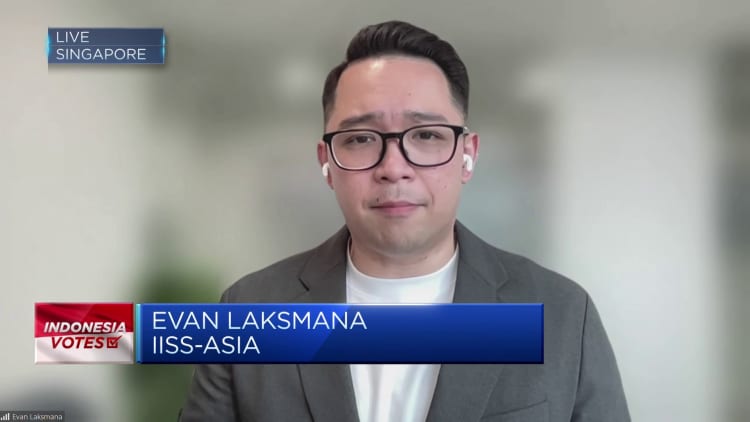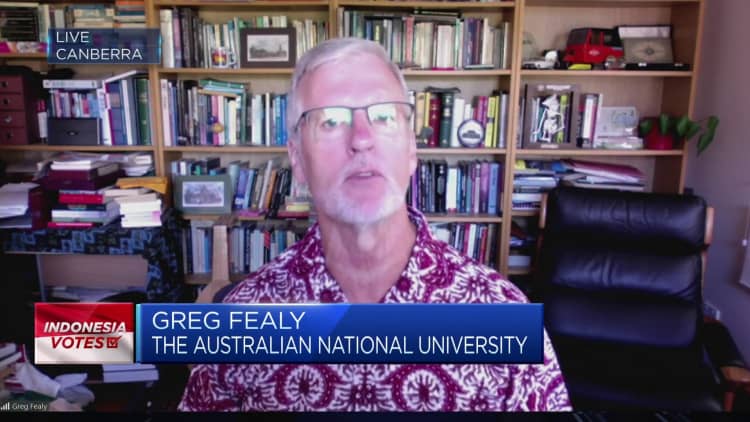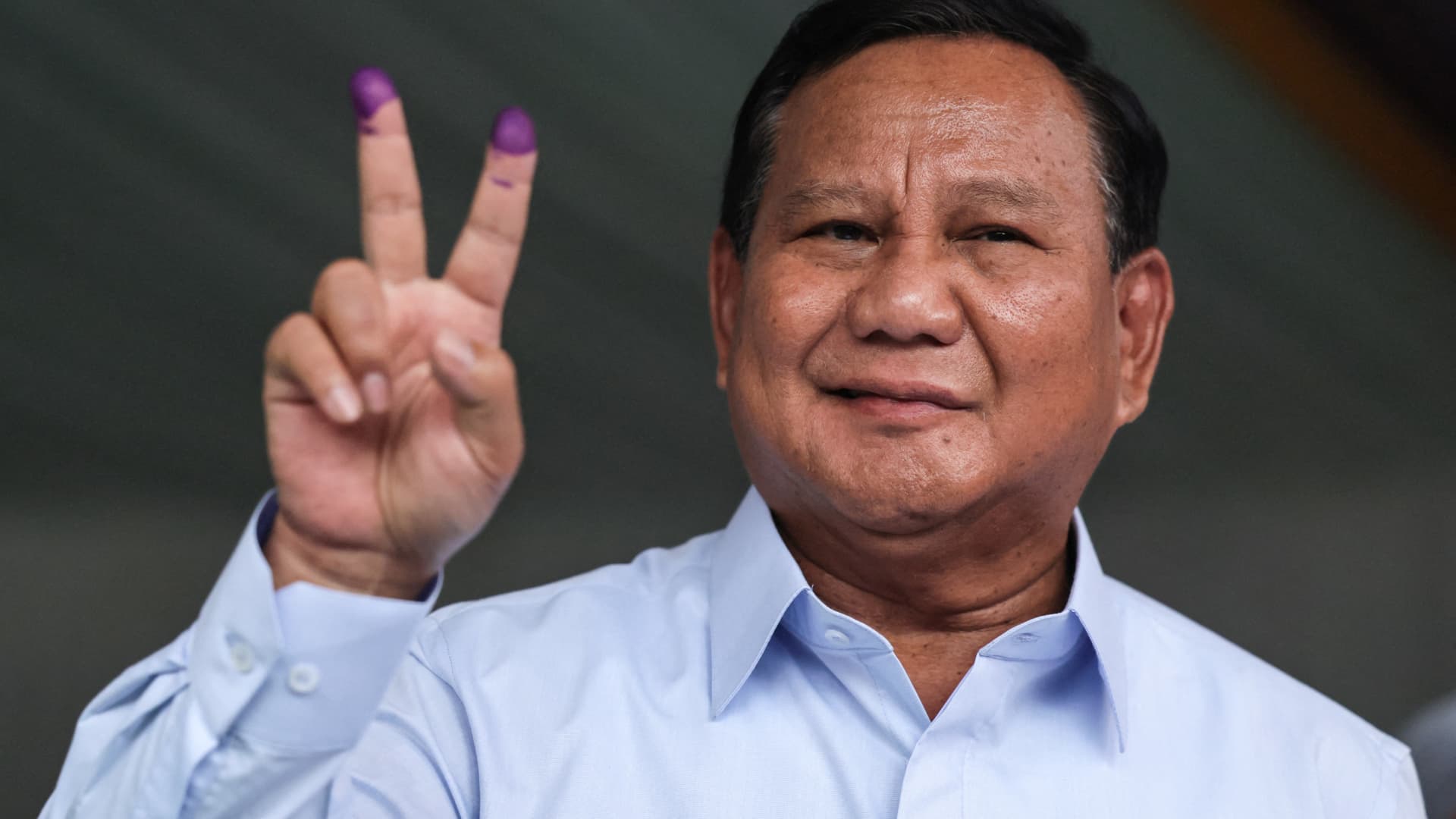Indonesia’s presidential candidate Prabowo Subianto gestures after he cast his ballot to vote in the country’s presidential and legislative elections at a polling station in Bogor on February 14, 2024. Indonesians began voting for a new president on February 14 with Defence Minister Prabowo Subianto the frontrunner to lead Southeast Asia’s biggest economy despite concerns over his human rights record.
Yasuyoshi Chiba | AFP | Getty Images
Indonesia’s Defense Minister Prabowo Subianto, a former army general, appears to have an early unofficial lead in the race to become country’s next president, “quick counts” show after voting in the world’s third-largest democracy closed on Wednesday.
Prabowo appears to have won a simple majority of ballots cast in Wednesday’s elections, with some early independent quick counts â sampling of actual vote counts at the various voting locationsâ putting his percentage of the popular vote at nearly 60% â substantively more than what pre-election opinion polls yielded.
Former Jakarta governor Anies Baswedan placed second in the presidential race â garnering just under a quarter of the votes so far, while the ex-governor of Central Java Ganjar Pranowo was third, according to the snap counts released by independent pollsters, including Indikator Politik, Litbang Kompas and Lembaga Survei Indonesia.
More than 200 million people were eligible to vote in only the sixth election in Indonesia since the country emerged from a military dictatorship under one-time President Suharto in the late 1990s. The outcome of these elections could go some way in affecting democratization in Indonesia, while determining if Southeast Asia’s largest economy would attain developed status by 2045.
Official results are not due until at least a month later. The winner will replace President Joko Widodo, popularly known as Jokowi, who is not standing for elections after having served the maximum of 10 years.
“It’s too early to conclude anything ⦠so we have to wait,” Anies told CNBC after the early snap counts suggested he was trailing Prabowo.
“Lots of reports have been coming in since a few weeks ago of possible irregularities, so we have to wait,” he told CNBC’s Martin Soong, repeatedly declining to go into more specifics.
The Prabowo campaign and Indonesia’s General Elections Commission â or Komisi Pemilihan Umum (KPU) â did not immediately respond to a CNBC request for comment.
Indonesia’s presidential candidates
Anies is running for president with the backing of three parties, including the secular Nasdem Party in the ruling coalition and the conservative Islamic Prosperous Justice Party (PKS). Muhaimin Iskandar, better known as Cak Imin and head of the National Awakening Party (PKB), is his vice-presidential running mate.
The third candidate Ganjar was nominated by the Indonesian Democratic Party of Struggle (PDI-P) as its presidential candidate, alongside Mohammad Mahfud Mahmodin as his vice-presidential running mate.

In Indonesia, only coalitions or individual political parties with at least 20% of the seats in the House of Representatives, or a quarter of the popular vote from the previous House of Representatives election, may propose presidential and vice-presidential candidate pairings.
Prabowo was nominated by his Gerindra Party. His vice-presidential running mate is Jokowi’s eldest son and current mayor of Surakarta or Solo, Gibran Rakabuming Raka â a show of Jokowi’s tacit support for Prabowo even though he has not explicitly endorsed any of the three candidates vying to replace him.
Gibran, 36, was added to the ticket after laws were amended to allow candidates below 40 years old to run for president or vice president if they have held regional office.

Even though Prabowo has pledged to continue Jokowi’s economic policies, it’s also unclear if he would derail two of Jokowi’s more visible legacies: the relocation of the national capital from Jakarta to Nusantara and turning Indonesia into a global hub for battery manufacturing.
“The percentages could still change with more data. However, the methodologies used by the three organizations that have released their quick count results are reliable, making it unlikely that Prabowo received less than the majority,” Teneo’s Managing Director Bob Herrera-Lim wrote in a client note after snap counts were released.
“Prabowo will likely aim to have a ruling coalition with at least 60% – 70% of parliamentary seats to ensure that his political agenda cannot be held hostage by one or two middle-sized parties. This makes major policy shifts unlikely early in the Prabowo administration,” he added.
Prabowo’s military past
To win outright, a candidate must obtain more than 50% of the national vote and at least 20% of ballots cast in more than half of the 38Â provinces in Indonesia on Wednesday. If no one achieves this, Indonesians across the world’s largest archipelagic state, spanning more than 17,000 islands, will head to a runoff between the two best performing candidates.
Voters had six hours Wednesday to cast their five ballots for their preferred presidential and vice presidential pairing, for legislators at the national, provincial and regency level, as well as a regional senator for the national parliament.
Polling station officer wearing Balinese traditional dance costume helps to cast the ballots during Indonesia General and Presidential Election at polling station in Penarungan Village, Badung Regency of Bali, Indonesia on February 14, 2024. More than 204 million people are eligible to cast ballots to elect the country’s next president, vice president and lawmakers for the parliament as well as members of provincial legislative bodies. With over 800.000 polling stations dispersed throughout the archipelago, approximately 204,8 million voters will use their democratic rights.
Johannes Panji Christo | Anadolu | Getty Images
Anies has pledged to deepen Indonesia’s nascent democracy in his election campaign, setting himself up against Prabowo’s controversial past.
Prabowo was once an Indonesian special forces commander. He was dishonorably discharged from the military in 1998 after troops under his command allegedly captured and tortured democracy activists opposed to the dictatorship of Suharto, his father-in-law, amid riots that preceded the start of democratic reforms.

Prabowo has also been accused of leading a massacre of hundreds in East Timor in 1983.
He has since been rebranded as a “cute” grandpa, with his campaign featuring his awkward dance moves on social media, endearing him to young voters. More than half of Indonesia’s electorate was born after 1980. The minimum voting age is 17.
â CNBC’s Celestine Francis Xavier and Charmaine Jacob contributed to this story.
